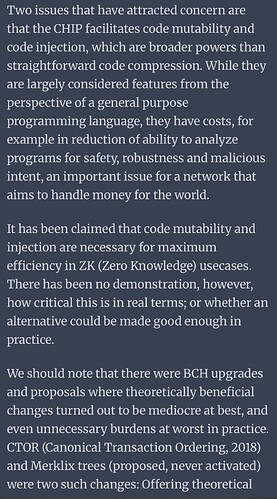Thanks for the review,
I agree that we’re honestly just scratching the surface wrt opportunities for scripting functions.
I have seen a lot of ideas that probably would need refinement and iterations to make them perfect. I’m comparing this to the “group” idea that on its own would indeed have worked, but the iterations and hard work turned it into a great solution instead and we now have FTs/NFTs that are stellar.
Your point with the library of functions being expensive if each is hashed was one that I also made in the past, while suggesting to use the concept called MAST that would be a trivial addition to allow some or many functions to be verified with only minimal number of bytes hash.
Additionally, a hash for code should likely be allowed to be a 20 byte one, not a 32 bytes. Making your 700 bytes setup become 22 instead.
That’s the point that seems to be unacknowledged, it really is not equivalent. And that is the main point where I expect people to start losing money.
You using OP_SPLIT and getting executable code from that is not some limiting factor in a UTXO setup.
A p2s script gets stored on the blockchain until it is spent. If in that script there is an eval that gets its code from anywhere else than the output that already on the blockchain, it becomes a puzzle piece that you need to find the matching piece for. But that doesn’t have to be the original piece, any thief can just create a new piece that fits. The moment they find something that fits, they can take the money stored on that utxo.
That people have attacked me saying that nobody will ever make this mistake, while i actually expect it to be a very common mistake for people that use p2s / op-eval as a replacement for p2sh. Security is hard, mistakes are extremely common.
Anyway, there is a lot possible to improve in functions. We stole the initial idea from Gavin, realizing it was quite simplistic. Then we looked at Nexa and realized that one was over engineerd and limiting. The first iteration was Ok, but I am happy to see that Jason took my idea of using opdefine instead of oppick to handle the code, which is absolutely a great improvement and everyone agreed on it being so.
So, this chip is better than it was at the beginning of the year, but iterating ideas still could very likely have made it better. I’ve tried, but I’ve openly been attacked in a way that makes it look like I didn’t like functions. While I’ve always been ambivalent. Very nasty politics there.
Yeah, Jason prefers long-form docs instead of posts here. As such it was an amalgamation of ideas, not a polished solution. As the status indicates. It packed in a LOT of concepts for this. It’s been out there for the entire year, but its ideas have been mostly ignored. Well, the “define” idea has been taken, which was the most important one, makes it worth it.
Yet, I feel we lost opportunities this year.
I don’t have anything against Jasons functions chip as it stands today, as the bar of it not hurting people has been reached. I do think we can do better, and ideally Jason decides to move it to next year to let it mature.

